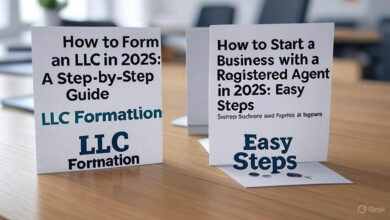Legal Business Structure: Choosing the Right One for Your Company

- Introduction: Why Your Business Structure Matters
Before you file paperwork or print business cards, one decision will shape your company’s future: choosing the right legal business structure.
Your structure affects everything—from how you’re taxed and paid to how you’re legally protected. It’s a critical first step for every entrepreneur, freelancer, and startup founder.
This post breaks down the major types of legal structures, their pros and cons, and how to choose the one that fits your business goals.
What Is a Legal Business Structure?
A legal business structure (or entity type) is the legally recognized form of business organization. It determines:
- How your business is taxed
- Your personal liability
- Regulatory obligations
- Ownership flexibility
- Ability to raise capital
The 5 Main Types of Business Structures
Let’s break them down simply:
1. Sole Proprietorship
Best for: Freelancers, solo entrepreneurs, low-risk businesses
Pros:
- Easiest to set up
- Complete control
- Minimal costs
- Simple tax filings
Cons:
- No liability protection
- Business and personal assets are legally the same
- Limited growth opportunities
Example: A self-employed graphic designer working alone.
2. Partnership
Best for: Two or more people starting a business together
Types: General Partnership (GP), Limited Partnership (LP), Limited Liability Partnership (LLP)
Pros:
- Shared responsibilities
- Easy to form
- Pass-through taxation
Cons:
- Shared liability (in GPs)
- Disputes can damage business
- Legal paperwork may be needed
Example: Two friends opening a local bakery.
3. Limited Liability Company (LLC)
Best for: Small-to-medium businesses seeking protection and flexibility
Pros:
- Personal asset protection
- Pass-through or corporate tax options
- Less paperwork than corporations
- Ideal for online and offline businesses
Cons:
- Formation costs (state fees)
- Annual filings required
- Rules vary by state
Example: A digital marketing agency formed as an LLC.
4. Corporation (C Corp)
Best for: Startups or businesses planning to raise capital
Pros:
- Strong liability protection
- Can raise capital through stock
- Perpetual existence
Cons:
- Double taxation (profits and dividends)
- Strict record-keeping
- More paperwork and compliance
Example: A tech startup seeking investors.
5. S Corporation (S Corp)
Best for: Profitable small businesses that qualify and want tax savings
Pros:
- Avoids double taxation
- Owners can take salary + distributions
- Pass-through taxation
Cons:
- Eligibility restrictions
- Limited to 100 shareholders (U.S. citizens or residents)
- IRS filings required
Example: A family-owned consulting firm with steady profits.
Key Considerations When Choosing Your Structure
- Liability Protection – Do you want to shield personal assets?
- Taxation – Prefer pass-through taxes or corporate tax structure?
- Investment Plans – Planning to attract outside funding?
- Control and Ownership – Solo or shared decision-making?
- Regulatory Requirements – Ready to handle filings and compliance?
Why You Need a Registered Agent
Every formal structure (LLC, Corporation, S Corp) requires a registered agent—someone to receive legal and official documents on your behalf.
✅ Benefits of Using a Registered Agent:
- Keeps your personal address private
- Ensures you never miss legal notices
- Helps with compliance and good standing
- Sends annual report reminders
💼 Top Registered Agent Services:
- Registered Agents Inc
- ZenBusiness
- Inc Authority
These services often assist with formation, compliance, and EIN/tax support.
Legal Structure Comparison Chart
| Structure | Taxation | Liability | Management | Cost |
|---|---|---|---|---|
| Sole Proprietor | Personal | Unlimited | Owner-run | Low |
| Partnership | Personal | Shared | Partners | Low |
| LLC | Flexible | Limited | Owner-managed | Medium |
| Corporation (C Corp) | Corporate | Limited | Shareholders & Board | High |
| S Corp | Pass-through | Limited | Shareholders | Medium |
Steps to Choose and Form Your Legal Structure
- Evaluate your business needs
- Choose a name
- Select a legal structure
- Appoint a registered agent
- File formation documents with the state
- Get your EIN from the IRS
- Open a business bank account
- Obtain required licenses and permits
Conclusion: Structure Your Business for Success
Choosing the right legal business structure isn’t just a legal formality—it’s a strategic move that shapes your business’s future.
Take your time, weigh your options, and get expert help if needed. Not sure where to start? An LLC offers a solid mix of protection and flexibility for most new businesses.
🎯 Need help forming your business?
Register your business today with expert guidance:
➡️ [Form Your LLC with Registered Agents Inc]
➡️ [Start with Inc Authority – It’s Free!]
➡️ [Hire Registered Agents Inc for Formation & Compliance]
Let me know if you’d like this version customized for your website, turned into a checklist, or designed for social media use!




